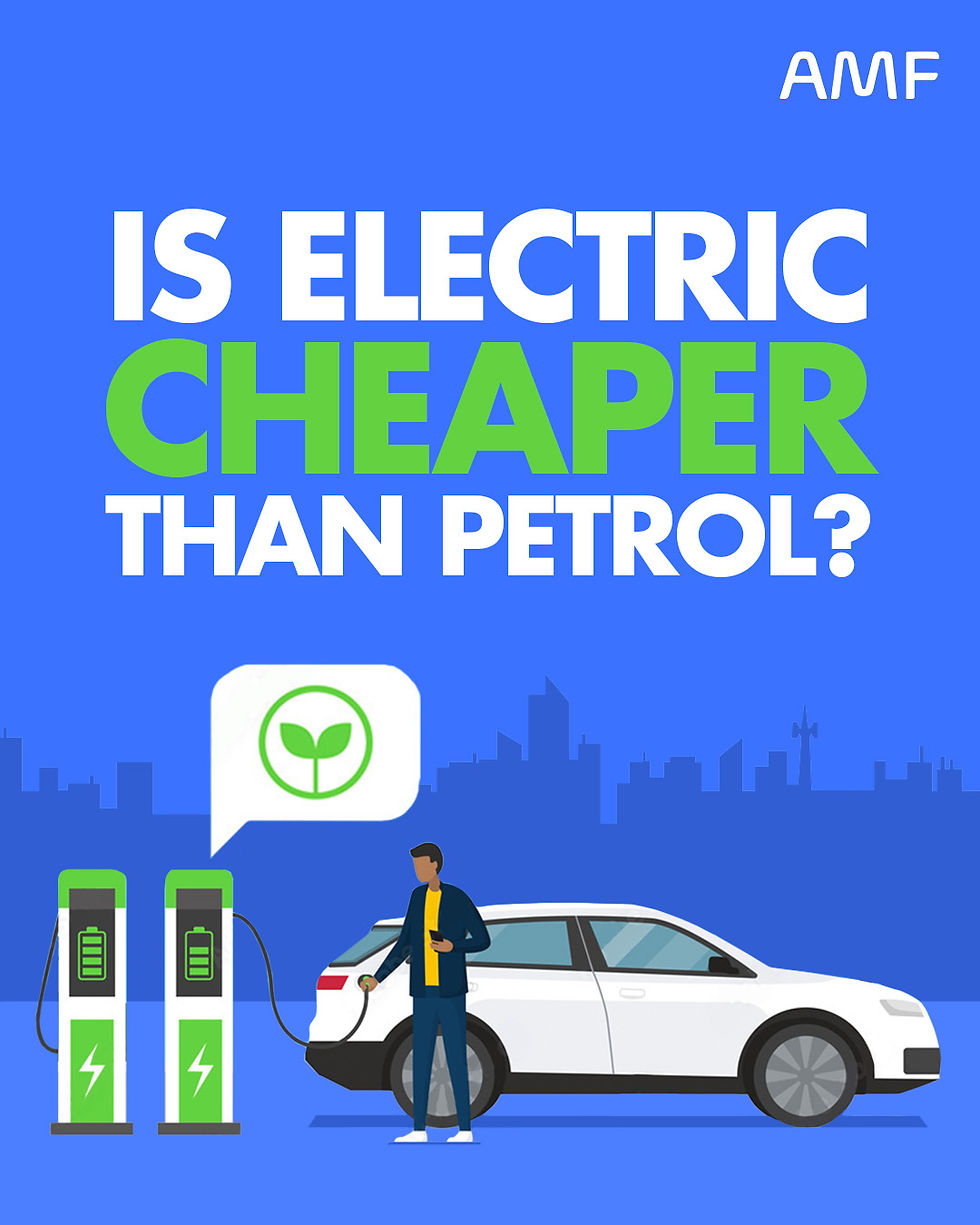WHAT IS THE COST OF CHARGING AN ELECTRIC VEHICLE? IS IT MORE AFFORDABLE THAN USING PETROL?
- Krish Appiah

- Nov 3, 2023
- 4 min read

Going electric offers several compelling reasons, one being the reduction of harmful CO2 emissions. However, another enticing aspect is the potential savings in electric car charging expenses. Historically, charging an electric vehicle has been more cost-effective than refuelling with traditional fuels. This cost disparity can translate into significant long-term savings for electric vehicle owners.
However, there are important conditions to consider. To truly benefit financially, most of your charging needs should be met at home, where electricity rates are typically lower, especially during off-peak hours. Some electricity plans even offer reduced overnight rates, making home charging even more economical. Public charging stations, including the high-speed ones at motorway service areas, tend to be pricier. While these are convenient for quick top-ups during long journeys, the convenience comes at a cost, often making the price per mile comparable to that of petrol or diesel vehicles.
Additionally, the extent of your savings depends on your driving habits. If you rarely drive or have a short, infrequent commute (especially if you work from home), the advantages of owning an electric car might not be as noticeable. However, if you cover a considerable distance annually and can charge your electric vehicle using a home wall box or garage outlet, you stand to benefit significantly. The key now is to precisely calculate the associated costs.
HOW DO I WORK OUT ELECTRIC CAR CHARGING COSTS?
Calculating your charging costs is quite straightforward. All you need to determine is the battery size, the car's range, and the electricity unit price per kilowatt-hour (kWh).
For instance, let's consider the Kia Niro EV, which comes with a 64.8kWh battery and a claimed range of 285 miles on a full charge. Assuming you're charging at home with an electricity cost of 34 pence per kWh (based on the capped average unit price from October 2022 to March 2023, though it might vary by region), a full charge for the Niro EV would cost you 64.8 times £0.34, totalling just over £22. This seems quite enticing, especially when compared to the fact that the average price of a fuel tank soared over £100 in June 2022.
However, it's essential to note that the Niro EV's official range is 285 miles according to lab tests. Real-world driving typically yields less, but similar adjustments are made for the 'official' fuel economy of petrol or diesel cars.
Considering the Niro EV's 285 miles from 64.8kWh, you get approximately 4.4 miles per kilowatt-hour (mi/kWh), a unit akin to mpg for electric cars. This figure of 4.4 mi/kWh is quite commendable. The most efficient electric vehicles can surpass 5.0 mi/kWh in the summer, while the least efficient struggle to reach 2.0 mi/kWh.
Now, if you're achieving 4.4 mi/kWh and you've paid £0.34 per kWh, your running cost per mile is less than eight pence, precisely £0.077.

HOW MUCH CHEAPER IS ELECTRIC THAN PETROL OR DIESEL?
Now, let's compare this to internal combustion engines. We can continue using the Niro as an example, as there is a petrol version available. Although, it's worth noting that the latest petrol Niro is a standard hybrid, requiring no plugging in, and all its energy comes from the 42-litre fuel tank.
On paper, the petrol Niro can achieve 64.2 miles per gallon (mpg), and according to RAC, the average price of unleaded petrol in the UK is 148.74 pence. With 4.546 litres in a gallon, one gallon costs approximately £6.76. By dividing 64.2 mpg by the price of a gallon, the running costs per mile amount to 9.63 pence. This makes driving the electric vehicle almost two pence per mile cheaper compared to the hybrid petrol version.
I THOUGHT THE SAVINGS WOULD BE... BIGGER
You have every reason to feel frustrated. Just a couple of years ago, domestic electricity was priced around 13-14p/kWh, nearly tripling since then, with the possibility of further hikes once the government's price cap is removed. This significant surge has substantially eroded the cost savings that EV drivers used to enjoy, and it remains uncertain when the situation will stabilize.
It's crucial to recognise that fuel prices have been similarly unpredictable. Not too long ago, fuel costs soared to £2 per litre due to Russia's invasion of Ukraine, a weakened pound against the dollar, and supply challenges. During that period, EV drivers felt quite pleased, but that sentiment has waned.
The reality is that energy prices, whether for electricity or fuel, are likely to keep fluctuating for the next year or two. Sometimes, the savings from going electric will be substantial, while at other times, they may not be as significant. Hopefully, after this period, we'll have a clearer understanding of the long-term trend.
In the past, the operating costs of electric vehicles were approximately one-third to one-quarter of their combustion engine counterparts. This made a compelling case for electric vehicle ownership, especially since EV purchase prices tended to be several thousand pounds higher. However, with the increasing cost of electricity, it will take longer to recoup that difference.
HOW MUCH DOES IT COST TO CHARGE IN PUBLIC?
The cost of charging varies based on the charging provider you choose. Tesla users on the Supercharger network pay a peak rate of 67p/kWh, whereas drivers of other brands are charged 77p/kWh. Ionity rapid chargers come at a cost of 69p/kWh, while Chargemaster/bp pulse chargers start at 65p/kWh for pay-as-you-go customers without a membership.

In simpler terms, charging in public places is approximately twice as expensive as charging at home. Therefore, if you don't have a personal home charging unit and rely on third-party chargers, it won't be cheaper – at least, not currently.
Are you in the market for a brand new car? That reality may be closer than you think! Contact our specialist motor finance broker team at Approved Finance to explore your finance options for your dream car. Krish Appiah and Jessica Peaks are here to assist you. Call 01908 429888 or email info@approved-finance.co.uk.
For any car guidance, please refer to our buyers guides found HERE


